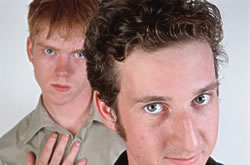EAT, DRINK & PLAY - ENTERTAINMENT
The Curfew: It Could Cost You
January, 2005 - Issue #4
 |
This all too familiar scenario can be avoided by simple adherence to Santa Clarita Municipal Code 11.56.020, otherwise known as the "curfew law." Anyone under 18 cannot be in public places without a parent or guardian after 10 p.m. seven nights a week, according to the ordinance.
"It keeps kids off the street in the middle of the night from being under the influence, burglarizing, fighting, the usual kids' stuff that turns into adult stuff real fast," said Sgt. Don Wyman from the COBRA (Career Offender Burglary and Robbery Apprehension) unit. "It's a good tool for parents. It gives them a little more leverage without making them the bad guys."
While many parents seem unaware of the ordinance, they seem supportive of the concept of a curfew. Some differ with the 10 p.m. limit, though.
"If they changed it to, say, midnight, I think more parents would support and enforce it on their own," said Andrea Stuart of Canyon Country, a mother of three teenagers. "For those who don't, a curfew becomes a necessary tool for the sheriffs to get kids off the streets by the wee hours of the morning for their own safety. There is absolutely nothing but bad going on by 1 a.m. out on the streets, no matter where you live."
Predictably, teens tend to reject the rigidity of a curfew. Many of them also take issue with the time frame.
"On weekends 10 p.m. is too early," said Ashley Rubay, 16, of Saugus. "That isn't even most kids' bedtimes. And a lot of the school events go way past 10 p.m."
Brandon Holliday, 16, of Canyon Country finds some inconsistencies in the regulations. As a new driver, he is lawfully allowed to be out driving until midnight.
Another Canyon High School tenth grader, Jonny McQueen, questions the necessity of a citywide curfew. "I think curfew should be more between parents and their kids instead of the government and kids," he said.
There are advantages to the existence of a curfew, according to some local therapists. One issue is safety. "Kids who stay out later are more at risk, exposed to partying or exposed to older kids who have access to alcohol," said Newhall psychologist, Robert Dosh. "The later they stay out the more they're exposed to less supervision in the community. Stores are shutting down."
The curfew is mostly a guideline for parents, Dosh said. Many parents realize that enforcement begins with them.
"My wife, Terry, and I have talked with our kids quite a bit about what is, and what is not acceptable," said Larry Comp of Valencia. He is the father of Colin, 16, and Conner, 14. "The boys have been very good about not violating our trust in them."
Trust in sheriff deputies who enforce the law is not unanimous among parents. Some claim questionable tactics. Stuart's 18-year-old son was pulled over by a sheriff while driving his friends home from a day at the beach. "He told them he was checking for curfew, and asked all six of them for ID to see if they were 18, and they were," said Stuart. "I think he did it just to harass them, and I have a huge problem with that."
Dosh said he has also seen abuse by law enforcement a few times.
"I've heard of overzealous police who approach kids when they are leaving the movies, going home or going to get picked up," he said.
Sheriffs do not participate in curfew sweeps, according to Wyman. But if officers stumble upon minors getting into mischief, they enforce the law.
"The most aggressive enforcement is at the mall on the weekends," said Wyman. "It became such a problem there."
Valencia Town Center became a hot spot for hundreds of kids to congregate on weekends, according to sheriff deputies. Teens have been caught fighting and stealing from cart vendors while hanging around after hours. With curfew enforcement, parents are picking up their kids in a more timely manner.
Disobeying the curfew law means a lighter wallet for offenders (or their parents, if they get stuck with their kid's tab). A youth's first ticket costs $278 and the price tag doubles with every offense. That is bound to be a deterrent for most youth of today who have places to go and things to buy.
|
||||||||||||||||||||||||||||




